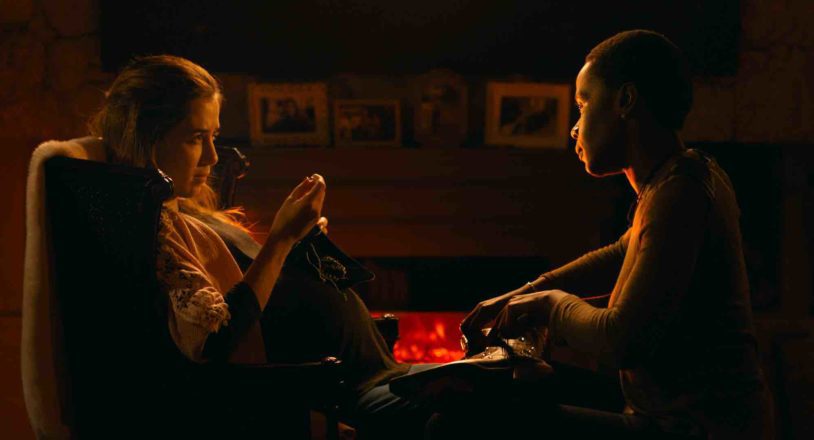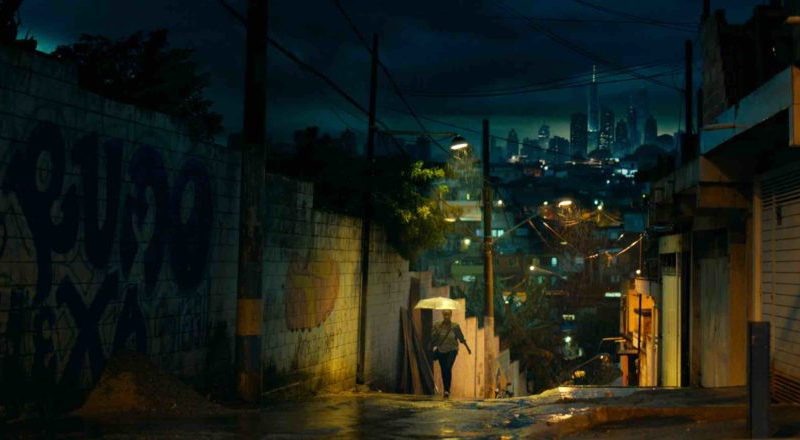INTERVIEW: Horror movie finds two women facing the supernatural in Brazil
Photo: Good Manners, the new horror movie starring Isabél Zuaa, was written and directed by Juliana Rojas and Marco Dutra. Photo courtesy of Cinema Tropical / Provided with permission.
Good Manners, the new horror movie from writer-directors Juliana Rojas and Marco Dutra, follows two women as they navigate their lives in modern-day São Paulo. Ana (Marjorie Estiano) is a wealthy woman expecting a child in a few months. She hires Clara (Isabél Zuaa), a nurse from another part of the city, to take care of her during the pregnancy and eventually the baby. The birth, however, does not go as planned, and Clara finds herself facing a supernatural reality that will impact her life forever.
Rojas and Dutra’s collaboration comes after their first film together, Hard Labor, which also introduced a supernatural element, but in a subtle way near the end. This one, which opens July 27 at the IFC Center in New York City, is more firmly set in the horror genre, featuring full moons, mysterious red meat packages in the refrigerator and unexpected deaths.
The idea for Good Manners came to the filmmaking team while they were working on their previous movie.
“We were working on a film, pre-production of a film, called Hard Labor,” Dutra said in a recent phone interview. “I had this dream that I told Juliana about that was a very disturbing image of two women taking care of a monster baby, a baby that was not human, and I felt there was potentially a story there. And I talked to her, and she agreed. And the image never left us, and after Hard Labor, we started developing the story itself.”
When Rojas and Dutra set pen to paper, certain facets of the project came fast. For starters, they wanted the title Good Manners because of the “educational aspect” of certain fairy tales that they had read and enjoyed.
“We felt, since this was a movie partly about raising a child, the title would be fitting, and also the idea of structuring the film in two parts, like one part about a pregnancy and the other part about the real child,” he said. “So those ideas were in the very early sketches for the film, and we ended up developing the script and the characters and everything else from this point.”
There is a big reveal in the film involving the baby in question. Many marketing materials for Good Manners give away the horror element, but Dutra would prefer audiences go in not knowing too much about the plot or what is to come.
“We liked the idea of a secret,” Dutra said. “Me and Juliana, we like to be surprised, so I don’t watch trailers, for instance. … It’s not something I like to do often because I think these days movie trailers reveal too much. I don’t read movie reviews before I watch the film. I do have an interest in being surprised, so we like when people go to see our films not knowing anything about it. I think it has a better effect on them because they have no expectations, and then the movie is just the ride. That’s always fun to watch that kind of audience, that kind of virgin audience.”
It doesn’t take long for the narrative in Good Manners to point toward the supernatural, and some audience members will pick up on what’s going on right away, while others may need to wait until that fateful pregnancy scene (a memorable scene, for sure).
“In Hard Labor, we knew that the film sort of changed genres as it developed, and the supernatural element was something that appeared right at the end,” Dutra said. “In Good Manners, when we started to write, we said, ‘Well, this one is going to be a fantasy from the beginning.’ And we did, but I think because we don’t know exactly what the baby is because we are in Clara’s position, there is more mystery in the first part. You don’t know what the creature is, what the baby is, so there is more mystery than there is in the second part. So by comparison, it feels like the supernatural is absent from the beginning of the film.”

It’s an important creative choice in the film to tell the story from Clara’s point of view. Besides being a modern fairy tale with horror elements, Good Manners also serves as social commentary on race, privilege, class and labor. Clara, who is black, applies for the position of the nanny and quickly learns the peculiar ways of her new employer, Ana, who is white. There also a few scenes in which the audience sees Clara heading home to her more humble abode, which is in stark contrast to Ana’s ritzy apartment.
“We started discussing who are these characters,” Dutra said. “We felt they should be boss and employee. That’s a type of relationship that me and Juliana really liked and that we explored a lot in our previous film. Hard Labor was basically about work relationships, and we wanted to bring something of that universe into this one because that’s something that we feel is very revealing about the present, about the world we live in.”
Rojas and Dutra realized they had many lenses to view Clara and Ana’s relationship — as employer/employee, friends, lovers, etc. Dutra called it a movie that delves into contrasts, and this duality helped develop the social commentary and also advance the horror elements. There was the human duality of different classes, different geographical locations in São Paulo, different races, different ages between mother and child. Then, there was the supernatural duality of innocence and violence existing in the same person.
“When we saw this opposition appearing in the structure and the story, we felt we should embrace that because it was what the film wanted to be in a way,” he said. “So we did, and we tried to embrace contrast as an idea that is in this film. And, of course, we end up discussing situations that exist in the world, especially in Brazil. We’re talking about Brazil, but I suppose that it’s natural that it’s also happening somewhere else, ideas of social extremes, especially rich and poor, and the idea of privileged and periphery neighborhoods.”
By John Soltes / Publisher / John@HollywoodSoapbox.com
Good Manners, written and directed by Juliana Rojas and Marco Dutra, stars Isabél Zuaa and Marjorie Estiano. The film opens Friday, July 27 at the IFC Center in New York City and Friday, Aug. 17 at the Laemmle Royal Theatre in Los Angeles. Click here for more information. Click here for Hollywood Soapbox’s interview with Juliana Rojas.

